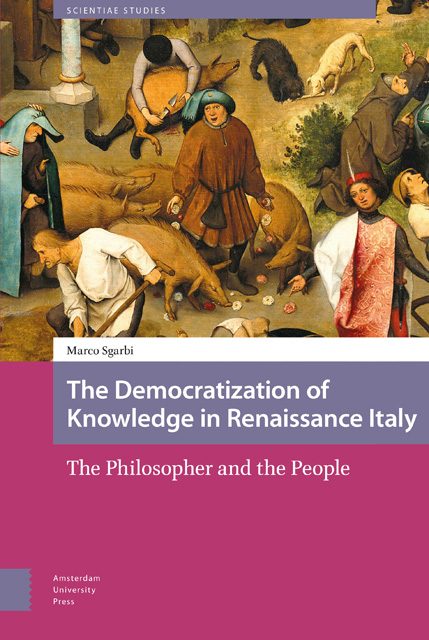2 - Tug of War
Published online by Cambridge University Press: 15 June 2023
Summary
Abstract
Chapter 2 describes the tug of war between a democratic vs an aristocratic conception of knowledge. The champion of democratization is Erasmus of Rotterdam. By examining fundamental texts like the Paraclesis and the Exhortatio ad studium Evangelicae lectionis, the chapter shows how Erasmus promotes a process of democratization from the perspective of both content and language. His idea fosters the transition from religion to any other form of philosophy. Against Erasmus, Alberto Pio from Carpi defends the closing-off of knowledge. Their struggle illuminates fundamental aspects of the democratization of knowledge that will set the agenda for sixteenth-century intellectuals.
Keywords: Erasmus, Alberto Pio, democratization, evangelical philosophy
Casting Pearls
The process of democratization of knowledge in Renaissance Italy can be helpfully illuminated by reflecting on two important passages in the New Testament that had legitimatized until then a substantially aristocratic approach to knowledge. The first passage is the Gospel according to Matthew 7:6, in which Christ peremptorily asserts
Do not give what is holy to the dogs; nor cast your pearls before swine, lest they trample them under their feet, and turn and tear you in pieces.
After the Sermon on the Mount, Christ summons his disciples, telling them not to waste things of value, especially holy things like the evangelical word by giving it to those unable to appreciate its message and who will only make dirty them. The idea suggests that knowledge should be kept as the prerogative of a limited group of people able to value the Bible’s message and understand its depth and mysteries. Not all knowledge should be shared. The second passage is Epistle to the Romans 11:20, in which according to the Vulgate St Paul wrote
Be not high-minded, but fear.
This Pauline sentence too would have led the ecclesiastical authorities to inhibit and quench the thirst for wisdom, and also the process of the democratization of knowledge, by binding the most important questions of life to matters of faith and religion. In general, these two evangelical messages have been consistently taken in the history of elite as an imperative not to disseminate or dissipate wisdom, as a sign that knowledge should be sealed off, allowed to circulate only within a narrow circle of intellectuals, or else the dignity of their ideas and doctrines will be lost and dispersed.
- Type
- Chapter
- Information
- The Democratization of Knowledge in Renaissance ItalyThe Philosopher and the People, pp. 19 - 46Publisher: Amsterdam University PressPrint publication year: 2022

